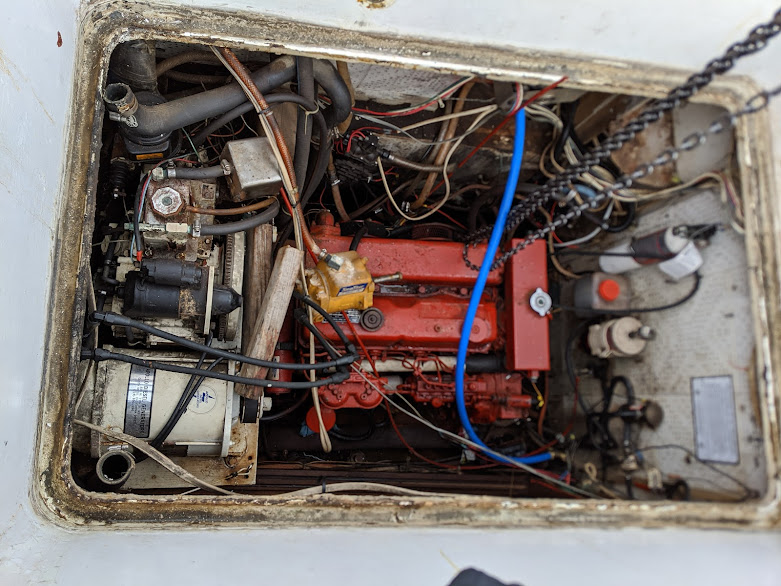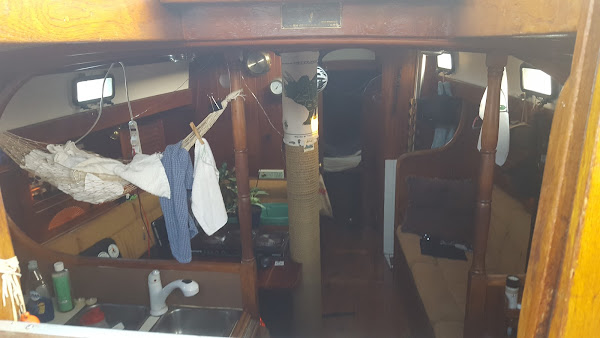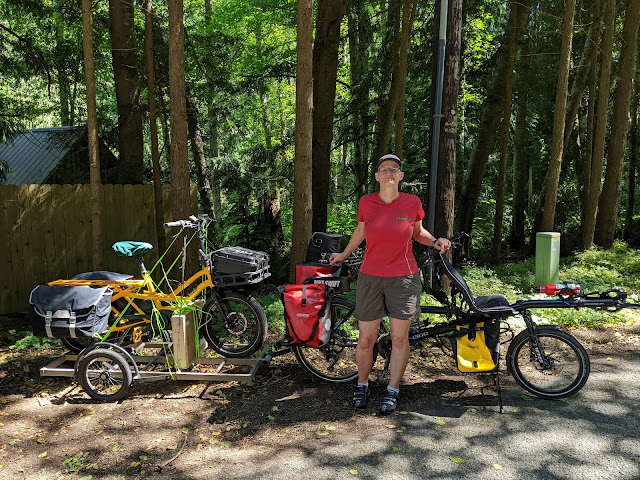What We Let Go Sings
 |
| Everything we own that isn't on the boat (much more orderly than the photo belies) |
This week, we rented a 20' U-haul and combined our two storage units into one. (Wayne: There is a love metaphor in there...)
We both purged our possessions several times over the past few years, and these are the items that have repeatedly made the cut. The only remaining non-folding furniture is the bookcase (already destined for a friend's house) and the big metal work table that will be handy for bike work and other projects.
Priorities
While sorting through the remaining heap, I realized that we have excellent priorities! We currently own:
- 5 bicycles
- 4 boats
- 3 tents
- 2 stand mixers
- 1 fog machine*
*Haunting the sailboat would be super cool, right?
We set a 3-month deadline for purging this storage unit and moving into a smaller one. We could fit all of this stuff into a smaller space, but we need to access a lot of it for projects and purging. Once it's better organized, we'll fit it in half the space, probably less. A lot of it will join us on the boat when we leave, but we want the extra space for working on projects in the meantime.
Possessed by Possessions
Possessed by Possessions
"The things you own end up owning you." — Tyler Durden, Fight ClubAs we hauled our stuff in and subsequently out of the truck, we talked a lot about feeling possessed by our possessions and how Stuff has filled Emotional Holes in our lives. We collected the most things when we were in unsatisfying relationships, and the happiest times of our lives have been less encumbered by material goods, marked even by purging of physical belongings. In times of emotional plenty, we focused on experience over acquisition, hiking over hoarding.
 |
| From Marrow Island by Alexis Smith |
It's amazing how separating from our things, even temporarily, decreases their emotional weight. Many of the things I couldn't part with last year seem silly now. Some things once important are now irrelevant, but they remind me of a different phase of life, and that is valuable. Do I really need to keep those little rubber frogs that rained from the ceiling of a Les Claypool show on New Year's Eve as we rang in 2001? Probably not.
 |
| I love real mail. Who doesn't? |
On the other hand, I love looking through old letters and photos as a reminder of my former self. I'm not sure what I'll do with the boxes of cards and letters I've been saving all my life when we leave. I plan to scan them, but I love holding the physical objects, feeling the texture of the paper, knowing that a dear friend scratched away with a ballpoint pen on a yellow legal pad, dripped Celtic Stew on a postcard written in a bar, or left the envelope within reach of a teething baby.
In the current move, we both had moments of looking at our remaining things and feeling that we could just let it all go, just drop it all off at a thrift store and say goodbye. I donated 2 large, beautiful pieces of furniture to the Habitat for Humanity store, and it felt like a great weight was lifted. I loved those things, but I love even more knowing I won't have to move them again.
Wait. What about your books?
Below is my allotted book space on the boat. When I showed my bookselling colleagues this photo, they looked at me like I'd gone off the deep end. There may also be a plastic bin of fiction in the forward berth, and there are definitely half a dozen cookbooks in the trunk of my car. There might be a bag of books behind the seat too. For years, they followed me home at night, creeping into corners and piling up when I wasn't looking. (Wayne: I call this bibliogenic osmosis.)
Not really visible in the storage photo at the top are eight big plastic bins full of books I collected over my 18 years in bookselling. When I moved to a new apartment in 2010, I had 55, albeit smaller, boxes of books. Each time I moved (three times in the past three years), I whittled the collection, selling and giving away thousands of titles. The books I kept are the signed copies and sentimental tomes. Over the past decade, I've met more than a thousand authors, and I've only kept a fraction of their books. Generally, I give away the books I've finished reading, passing them on to other booksellers, friends, or my mom and her book club in Kentucky. I used to keep bags of books in my living room and foist them on dinner guests who lacked reading material. (Wayne: BAGS! Literally, a living room full of books.) They were just waiting for the right reader to come along.
So what's in all those book boxes?
In 2008, I went to a pre-publication dinner for Jamie Ford, celebrating Hotel on the Corner of Bitter and Sweet. I loved the book, and it quickly became a local classic. We hosted the author on his hardcover tour and had a little tea party in the back corner of the store for local book clubs. Jamie and his wife Leesha were funny and charming, the kind of people who feel like friends after just a few minutes. Jamie is a hiker and comics nerd when he's not writing, and I recommend following him on social media if you're into that sort of thing. Also, read his book! Then go drink some tea at the Panama Hotel in Seattle before you walk through Seattle's International District eating every dumpling in sight. So anyway, I still have the advance copy of Hotel that Jamie signed for me at the pre-release party. No photo, because it's squirreled away in a box. I'll make do with the shelf talker I wrote when it was new:
 |
| Read this book! |
 |
| Read this book too! |
Ten years later, Johnny is still one of my favorite people in the book business, and his events (and anything else he does) are always energetic, stream-of-consciousness affairs. He supports other authors, inviting them to write with him at his cabin, blurbing their books, giving advice, and sharing his own good fortune, never losing sight of how far he's come. So how can I part with his books, all signed to me with personal notes? Especially the one that came in the coolest packaging ever?
No one goes into the book business to get rich, and that's what makes it the best business.
Like these examples, most of the books that I'm reluctant to sell or give away are souvenirs of people whose company I enjoy and the heart and soul they pour into their art. I could go on and on about the amazing people I met working in the world of books. Seattle is awash in great authors who are also generous and kind humans. The lucky ones earn a living doing what they love, and I spent many years reading debut novels and telling people about them so that they might continue. When customers asked me why I had neglected to read a particular classic, I would respond, "Famous authors don't need my help. If I don't read new authors and tell you about them, who will?"




Comments
Post a Comment